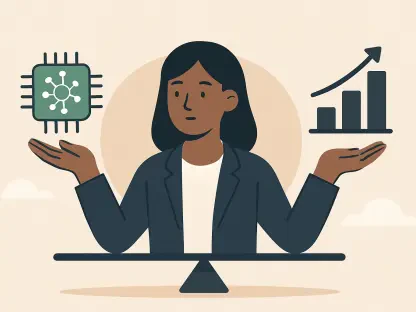Modern technological tools are revolutionizing the field of therapy by improving the efficiency and outcomes of therapeutic practices. They reduce the burden of administrative tasks, enhance therapeutic processes, and foster better client-therapist relationships. The primary focus is on various modern solutions available to therapists, shaping a more streamlined, effective, and client-centered approach within mental health services.
Streamlining Administrative Tasks
The Burden of Administrative Responsibilities
Therapists often struggle to balance their heavy administrative responsibilities with client care, creating a significant burden on their ability to provide effective treatment. According to a 2022 survey, 79% of mental health professionals reported that administrative tasks significantly impeded their ability to focus on clients. These tasks include scheduling appointments, processing payments, maintaining accurate documentation, and managing electronic health records. This overwhelming administrative workload distracts from the core therapeutic processes and can lead to decreased job satisfaction and burnout among therapists. Subsequently, the imbalance can also impact the quality of care clients receive.
Comprehensive Practice Management Tools
Comprehensive practice management tools have become invaluable in tackling these challenges by automating many of these processes. Such tools significantly reduce the risk of errors that can occur in manual entry and documentation, ensuring timely transactions and secure client interactions. By freeing up their time from administrative burdens, therapists can devote more focus and energy to client care. These tools include features like automated appointment scheduling, electronic billing, secure messaging, and integrated documentation systems. Additionally, having streamlined processes in place helps maintain compliance with various regulations and enhances overall organizational efficiency, benefiting both therapists and the clients they serve.
Enhancing Therapeutic Processes
Treatment Planning Tools
One critical asset for therapists looking to enhance their efficiency without sacrificing care quality is the use of sophisticated treatment planning tools like the Wiley Treatment Planner. This tool offers pre-written treatment plans for a variety of mental health issues, including anxiety, depression, and PTSD. These pre-formulated templates can be quickly adapted to suit the unique needs of individual clients, significantly reducing the time typically spent on planning. By minimizing this planning period, therapists can allocate more time to building rapport with their clients and delivering impactful interventions that are tailored to specific therapeutic goals.
Consistency in Care
The Wiley Treatment Planner also plays a vital role in ensuring consistency in care, especially for practitioners with heavy caseloads. This tool streamlines the treatment planning process, making it easier for therapists to maintain high standards of care across all clients. Consistent use of these treatment plans helps in monitoring client progress over time and making necessary adjustments to the therapeutic plan efficiently. Furthermore, it provides a structured framework that supports evidence-based practices, ensuring that all clients receive a level of care rooted in proven methodologies. Such structured care processes are particularly beneficial in large practices where multiple therapists might collaborate on a single client’s care, offering continuity and coherence in therapeutic strategies.
Expanding Access through Remote Therapy
The Shift Towards Remote Therapy
The advent of virtual platforms has sparked a crucial shift in the field of therapy, vastly expanding access to mental health services. These platforms enable therapists to conduct sessions securely and in compliance with privacy regulations, which is integral in protecting client confidentiality. Key features of these platforms include video conferencing, interactive tools for collaboration, and the ability to record sessions. These features collectively enhance the therapeutic process, making it dynamic and adaptable to various needs. Remote therapy’s accessibility has become particularly vital during times when in-person sessions are not feasible, ensuring that clients continue to receive the care they need uninterrupted.
Flexibility and Accessibility
This monumental shift also allows for greater flexibility, accommodating the unique needs of both clients and therapists. By leveraging remote platforms, therapists can bridge geographical gaps, providing mental health services to clients who might otherwise have limited access due to location constraints. Flexibility in scheduling can help accommodate clients with rigid work schedules or those who prefer therapy from the comfort of their own homes. Ultimately, remote therapy makes mental health services more inclusive and accessible, ensuring that clients can receive consistent, quality care regardless of their location or personal circumstances. This adaptability is crucial in fostering a supportive and responsive therapeutic environment.
Promoting Client Engagement
Digital Tools for Self-Monitoring
Digital tools designed for self-monitoring and skill-building are instrumental in encouraging client participation and engagement between therapy sessions. These applications allow clients to track their moods, practice therapeutic techniques learned during sessions, and document their personal reflections and experiences. This level of active involvement aids in reinforcing the progress made during therapy by providing clients with continuous opportunities for self-assessment and growth. By using these tools, clients can develop better self-awareness and actively participate in their healing and development process. Therapists can then use the data generated from these tools to gain deeper insights into their clients’ experiences and tailor interventions more effectively.
Reinforcing Client Progress
Active client involvement through digital tools not only reinforces client progress but also provides therapists with valuable insights into their clients’ experiences. This enhanced understanding ensures that therapy remains effective and aligned with clients’ evolving needs. By facilitating real-time data collection and analysis, these tools enable therapists to make informed decisions about treatment adjustments, thus optimizing therapy outcomes. Clients who feel more engaged and involved in their treatment are likely to experience greater satisfaction and motivation, contributing to more meaningful and sustained therapeutic outcomes. Such active participation is vital to fostering a sense of agency and empowerment among clients.
Advancements in Supervision and Training
Digital Platforms for Supervision
Advancements in digital platforms have also revolutionized supervision and training within the therapeutic profession, providing virtual meeting spaces and organized feedback systems. These digital platforms simplify logistical challenges, such as coordinating schedules and managing extensive physical documentation, making the supervision process more efficient and structured. They also support progress tracking, enabling supervisors to monitor the development of trainees systematically. Using technology, supervisors can conduct detailed reviews and provide comprehensive feedback to trainees, enhancing the overall quality of mentorship and professional development within the field of therapy.
Enhancing Training Experience
As a consequence of these advancements, supervisors can provide more efficient feedback and support to trainees, significantly enhancing their training experiences and overall professional growth. Digital platforms facilitate dynamic learning environments through interactive features, making supervision sessions more engaging and productive. Moreover, these platforms support peer collaboration and shared learning experiences, which are critical for developing a well-rounded understanding of therapeutic practices. By leveraging these digital tools, new therapists are better prepared to deliver high-quality care, ensuring they uphold the standards and values of the profession. Ultimately, these tools foster a culture of continuous learning and improvement within the therapeutic community.
Improving Client Assessments
Digital Assessment Tools
Digital assessment tools have proven to be an invaluable resource for therapists aiming to gain deeper insights into their clients’ mental health efficiently and accurately. These tools automate the process of data collection and analysis, ensuring precision and supporting better decision-making. This automation allows therapists to obtain a comprehensive understanding of a client’s mental health status at various stages of therapy. Equipped with this precise data, therapists can effectively tailor interventions to meet the individual needs of each client. Digital assessment tools also facilitate ongoing monitoring of client progress, enabling timely and informed adjustments to therapeutic plans as needed.
Tailoring Interventions
Whether used at the initial stage of therapy or for monitoring progress, digital assessment resources are indispensable for tailoring interventions specific to individual client needs. Improved assessment capabilities lead to better treatment outcomes by providing a nuanced understanding of client challenges and strengths. These tools support a more personalized and responsive approach, ensuring that interventions are well-suited to the unique contexts and conditions of each client. Enhanced assessment capacities not only improve the accuracy of diagnoses but also foster a more collaborative and goal-oriented therapy process, ultimately contributing to more effective and meaningful therapeutic outcomes for clients.
Embracing Modern Technology
Growing Reliance on Digital Tools
The growing reliance on digital tools and platforms in handling various aspects of therapeutic practice is driven by a compelling need to streamline administrative tasks, enhance therapeutic processes, and improve overall client outcomes. As the landscape of mental health services evolves, embracing modern technological tools is not only beneficial but indeed necessary. These advancements equip therapists with the means to manage more substantial workloads without compromising the quality of care provided. The integration of digital solutions within therapeutic practices supports a more efficient, collaborative, and client-centered approach, aligning with the increasing demand for accessible mental health services.
Maintaining High Standards of Care
Modern technological tools are transforming the field of therapy by significantly improving its efficiency and enhancing the outcomes of therapeutic practices. These tools alleviate the burden of administrative tasks, streamline therapeutic processes, and facilitate stronger client-therapist relationships. Therapists can now take advantage of a variety of innovative solutions, which help in creating a more effective and client-focused approach in mental health services. For instance, digital platforms enable therapists to manage schedules, billing, and client records seamlessly, saving valuable time and reducing paperwork. Additionally, teletherapy offers clients the convenience of receiving therapy from the comfort of their own homes, breaking down geographical barriers and increasing accessibility. Advanced data analytics tools provide therapists with deeper insights into treatment progress, allowing for more personalized interventions. Furthermore, virtual reality can be used to create immersive experiences that aid in treating conditions like PTSD and anxiety. Overall, these modern tools are reshaping the therapeutic landscape, making it more efficient and client-centered.









